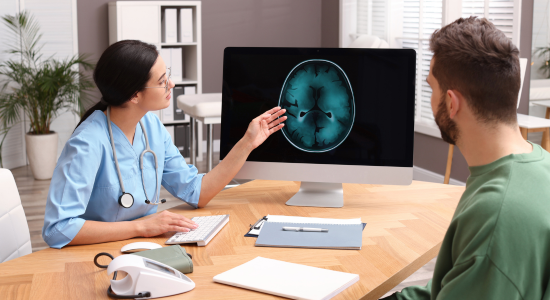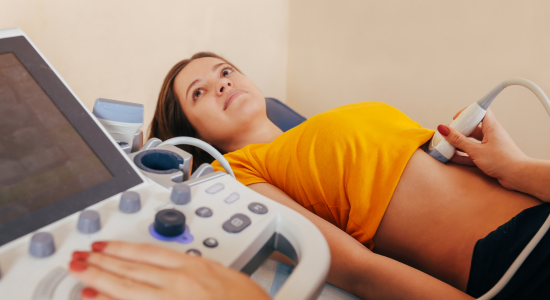- Prostatitis treatment
- Benign prostatic hyperplasia treatment
- Premature ejaculation treatment
- Treatment of erectile dysfunction
- Phimosis treatment
- Tight frenulum treatment
- Hydrocele treatment
- Varicocele treatment
- Shockwave therapy
- treatment of cystitis
- PYELONEPHRITIS TREATMENT
- BALANITIS AND BALANOPOSTHITIS: CAUSES, SYMPTOMS AND TREATMENT
 Pyelonephritis is an inflammation of the kidneys that develops when an infection occurs. It primarily affects the tubules and renal-collecting system of the kidneys, resulting in the disruption of blood filtration, loss of microelements and other disturbances.
Pyelonephritis is an inflammation of the kidneys that develops when an infection occurs. It primarily affects the tubules and renal-collecting system of the kidneys, resulting in the disruption of blood filtration, loss of microelements and other disturbances.
SYMPTOMS OF ACUTE PYELONEPHRITIS
Acute pyelonephritis is characterized by severe symptoms. Its signs are the following:
- pain in the lower back, lumbus, in the side;
- frequent urge to urinate;
- discoloration of urine, the appearance of sediment;
- night-time diuresis;
- slight swelling;
- thirst;
- temperature increase;
- general weakness;
- nausea, vomiting.
Symptoms may differ depending on the form and stage of the disease, the presence of accompanying pathologies. In some patients, acute pyelonephritis develops amid cystitis, prostatitis or other diseases of the genitourinary system.
In men and women, the symptoms of pyelonephritis are similar, but in children, the disease can manifest itself atypically – night-time diuresis, loss or gain in body weight, etc.
SYMPTOMS OF CHRONIC PYELONEPHRITIS
Chronic pyelonephritis retains a sluggish inflammatory process that causes symptoms to become less pronounced.
The signs of chronic pyelonephritis are the following:
- periodic aching pain in the lower back, in the side or lower abdomen;
- discoloration of urine, sediment;
- increased thirst;
- swelling;
- rapid fatigability;
- weight loss or weight gain;
- night-time diuresis, etc.
Chronic pyelonephritis can escalate and pass into remission. In the first case, the symptoms increase, forcing the patient to see a doctor. On the contrary, during remission, they can practically disappear.
TYPES OF PYELONEPHRITIS
For more accurate diagnosis and treatment, pyelonephritis was classified by several parameters.
In terms of the number of kidneys affected, pyelonephritis occurs:
- one-sided - one kidney affected;
- two-sided - inflammation in two kidneys.
- By the characteristics of the inflammatory process:
- acute;
- chronic.
Chronic pyelonephritis is also divided into:
- latent - sluggish inflammation;
- recurrent - the disease progresses, exacerbations often occur;
- hypertensive - accompanied by high blood pressure;
- anemic - accompanied by anemia, etc.
Depending on the patency of the urinary tract, pyelonephritis is:
- obstructive - patency is impaired due to the formation of stones;
- non-obstructive – normal patency.
Depending on the method of infection penetration and the presence of other diseases:
- primary - developed as an independent disease;
- secondary – pyelonephritis is a complication.
CAUSES OF PYELONEPHRITIS
In most cases, pyelonephritis develops due to bacteria entering the kidneys. This can happen in two ways: through the urethra, as well as from other organs along with the bloodstream and lymphatic fluid. The disease is most often provoked by Escherichia coli, less often by an enterococcal or staphylococcal infection.
In addition, inflammation of the kidneys can begin due to a violation of the outflow of urine in polycystic, prostate adenoma, inflammation of the uterine appendages, etc.
RISK FACTORS OF KIDNEY PYELONEPHRITIS
Factors that increase the risk of pyelonephritis include:
- urethritis;
- cystitis;
- sore throat;
- sinusitis;
- pneumonia;
- kidney stone disease;
- diabetes;
- low immunity;
- helminthic invasion;
- hypothermia;
- pregnancy.
If there is an infectious site in the body, blood and lymph can spread bacteria throughout the body. Therefore, kidney inflammation can develop even with pneumonia or angina.
DIAGNOSIS OF PYELONEPHRITIS
During the first visit, the nephrologist examines the symptoms that disturb the patient, and the history of the disease - the presence of chronic pathologies and recently suffered diseases. After that the doctor conducts an examination as for swelling and other visible changes. As a diagnosis of the kidneys, the doctor can perform tapping with the edge of the palm under the ribs. The pain indicates an inflammatory process.
The following methods are used to make an accurate diagnosis:
- general urinalysis;
- bacterioscopic analysis of urine;
- urine analysis according to Nechiporenko;
- general blood test;
- biochemical blood test;
- ultrasound of the kidneys and pelvic organs.
The scope of examinations is determined by the physician individually, taking into account the symptoms and general health condition.
TREATMENT OF PYELONEPHRITIS IN «OXFORD MEDICAL»
The treatment of pyelonephritis depends on the form and stage of the disease, as well as the presence of complications.Most often the following methods are prescribed:
- antibacterial therapy;
- anti-fever drugs;
- anti-inflammatory drugs;
- antispasmodic drugs;
- physiotherapy procedures;
- diet plan;
- surgical treatment (in case of complications).
The main one is drug therapy. The physician prescribes drugs that make it possible to eliminate infection and inflammation, as well as to relieve symptoms. A separate role is assigned to diet plan. Products that increase kidney burden should be excluded. Patients are advised to refrain from fatty meat, semi-processed meat, spices, salty and spicy dishes. Instead, fresh vegetables and fruits, cereals and lean meat are added to food spectrum.
Obstructive pyelonephritis and complications may require surgical treatment. In «Oxford Medical» surgeries are carried out by a non-invasive method, using advanced medical achievements.
COMPLICATIONS OF PYELONEPHRITIS
Acute pyelonephritis can be cured with medication in most cases. But if treatment does not start on time or is not done correctly, the disease can become chronic or cause other complications.
The most common are:
- purulent inflammation of the kidneys;
- nephrogenic arterial hypertension;
- paranephritis - bacterial inflammation of the tissues that surround the kidneys;
- glomerulonephritis - damage to the renal glomeruli, which filter the blood;
- renal failure;
- blood poisoning;
- granular kidney;
- necrosis of kidney tissue, etc.
PYELONEPHRITIS PREVENTION
The main cause of pyelonephritis is infection. It can penetrate the kidneys through the urethra or with blood coming from another part of the body.
Therefore, for prevention, it is recommended:
- treat all infectious and inflammatory diseases on time;
- do not self-medicate;
- avoid hypothermia;
- strengthen the immune system;
- for women - have an annual examination by a gynecologist, and for men - by a urologist-andrologist.
At «Oxford Medical» you can get tested and diagnosed on new equipment from leading brands. After the diagnosis is made, our doctors will find the best possible way of treatment and help to defeat the disease. The clinic employs highly qualified specialists with many years of experience.
To make an appointment, call our Contact Center or write in a chat on the website.
Our EXPERTS
all expertsreviews
department: Urology
department: Urology
department: Urology
department: Urology
Special offers
current information
Video reviews
A true guarantee of quality and comfortable treatments are thousands of satisfied patients
Glubochitskaya street, 40X
phone:
+38 (044) 204-40-40
show - Viber, Telegram
Pavlovskaya street, 26/41
phone:
+38 (044) 204-40-40
show - Viber, Telegram
st. Predslavinskaya 29
phone:
+38 (044) 204-40-40
show - Viber, Telegram
Bereznyakovskaya street, 30B
phone:
+38 (044) 204-40-40
show - Viber, Telegram
Sribnokilskaya street, 20
phone:
+38 (044) 204-40-40
show - Viber, Telegram
st. Mokra, 20A
phone:
+38 (044) 204-40-40
show - Viber, Telegram
Ivana Kramskogo street, 9
phone:
+38 (044) 204-40-40
show - Viber, Telegram
Obolonska Naberezhna Street 1, building 2
phone:
+38 (044) 204-40-40
show - Viber, Telegram
st. Mikhaila Grishka, 1
phone:
+38 (044) 204-40-40
show - Viber, Telegram
Knyaziv Ostrozskykh street, 46/2
phone:
+38 (044) 204-40-40
+38 (097) 204-84-84 - Viber, Telegram
Mykhaila Dragomirova street, 14B
phone:
+38 (044) 204-40-40
show - Viber, Telegram
телефон:
+38 (044) 204-40-40
+38 (097) 204-84-84 - Viber, WhatsApp, Telegram
Irpen. Universitetskaya street, 2/1; building 3
phone:
+38 (044) 204-40-40
show - Viber, Telegram














